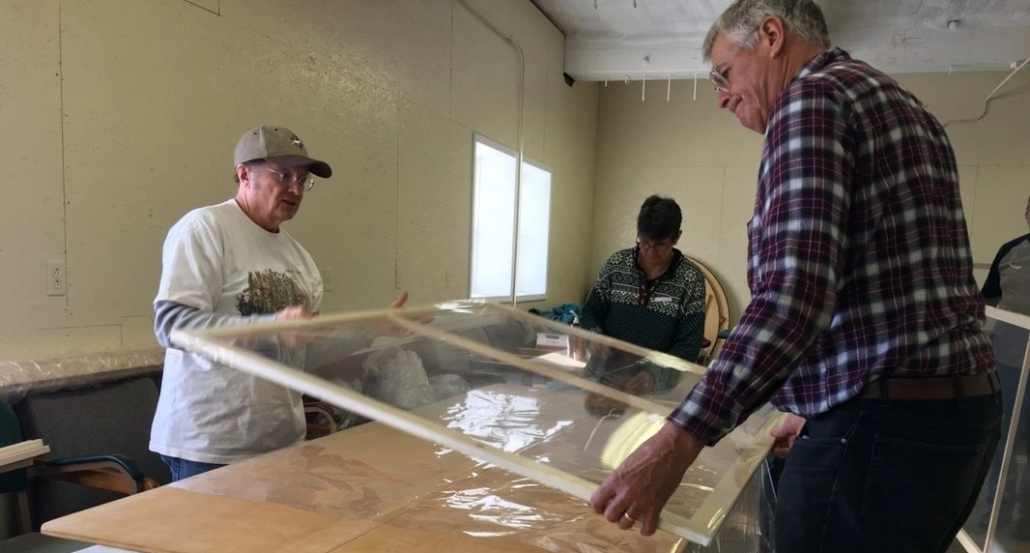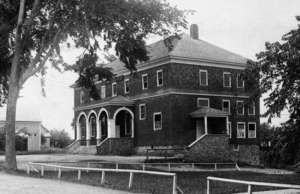Volunteers needed for Window Dressers workshop
/0 Comments/in China, Community, Events/by Eric W. Austin
Volunteers prepare window inserts at a previous WindowDressers workshop, in Vassalboro. (photo courtesy of Vassalboro Historical Society)
by Eric W. Austin
The China for a Lifetime Committee is planning a Window Dressers workshop this November 7-13, at the China Lake Camp, off the Neck Road, on the west side of the lake. The initiative is a volunteer-led, barn-raising effort to construct low-cost “window inserts” that can significantly reduce residential energy costs. Orders for inserts need to be submitted to the China Town Office or through the Window Dressers’ website by September for the November workshop.
The insulated window inserts are constructed of pine wood frames, and can be ordered in natural wood or painted white. There is a maximum order limit of 10 frames, and no minimum. Orders are open to all residents of China, Vassalboro, Palermo, Albion and Windsor.
The price of the window inserts varies depending on the size of the frame requested, but generally range from $30-$70 per frame for natural pine, with an additional $5-$10 if painted white. Discounts and financial help are available for those who qualify.
As the workshop will take place during the second week of November, orders should be placed by September. Volunteers will need to visit your home to take window measurements which will then be sent to the Window Dressers organization, who will cut the wood for the frames and deliver them in time for the workshop. All volunteers visiting customer homes to measure windows are required to be vaccinated for COVID-19 and wear a mask.
There is a great need for local community volunteers to make this a successful Window Dressers workshop. It is requested (but not required) that anyone ordering frames also commit to a four-hour shift on one of the workshop days. The committee is also looking for anyone who can supply food to the teams participating in the workshop.
To submit an order for window inserts, or to volunteer, please call the China Town Office at 445-2014, send an email to chinaforalifetime@gmail.com, or visit the Window Dressers website and fill out the request form at windowdressers.org/sign-up-for-inserts.
For more information about the China for a Lifetime Committee, please visit their website at chinaforalifetime.com.
China TIF committee discusses pending project at China Village boat launch
/0 Comments/in China, News/by Mary Grow by Mary Grow
by Mary Grow
Members of China’s Tax Increment Financing (TIF) Committee approved a funding application, discussed a pending project and heard updates on on-going ones at their June 29 meeting.
The committee’s job is to make recommendations to the select board and voters for spending revenue in the TIF Fund. The money comes from taxes on Central Maine Power Company’s north-south line through town and the company’s substation in South China. Recommendations are within the limits set in the TIF plan, approved by town voters and by state regulators.
China Community Days asked for $10,000 for fireworks and other purposes for this summer’s celebration, scheduled for Friday, Aug. 5, through Sunday, Aug. 7. TIF Committee members unanimously approved.
The pending project is doing something about the China Lake boat landing in South China Village, which has limited access, shallow water, erosion problems and undefined lot boundaries. The first step is to define the lot lines; new committee chair Brent Chesley said Town Manager Rebecca Hapgood is seeking a surveyor.
Depending on how much land the town owns, options include providing more parking and maintaining a full-service boat landing; limiting parking and allowing hand-carry (canoes and kayaks) launches only; or discontinuing use as recreational lake access. If the area were no longer a boat landing, committee members discussed ongoing access by town firefighters.
Resident Scott Pierz, executive director of the China Region Lakes Alliance, reported briefly on four major programs, partly TIF-funded, aimed at improving water quality in China Lake and other area water bodies:
- The Courtesy Boat Inspection program is intended to keep invasive plants out of local waters by inspecting boats before they are launched. The program currently has too few employees to cover all boat landings, Pierz said.
- The Gravel Roads Rehabilitation Program helps road associations make environmentally sound improvements to camp roads.
- The LakeSmart Program, run in cooperation with the Maine Lakes Society and the local China Lake Association, helps shoreland property owners minimize runoff into water bodies.
- The Youth Conservation Corps employs local young people to work on environmental improvement projects.
Four Seasons Club President Tom Rumpf reported on work done on trails in town and on plans for continued work. He discussed state grant possibilities and revised state regulations and oversight. Misuse of ATV trails, including incidents like the recent vandalism to bee hives in Albion (which had nothing to do with Four Seasons Club trails, Rumpf said), discourages landowners from allowing trails on their property and increases state involvement.
After electing Chesley TIF Committee chairman, succeeding Tom Michaud who declined to continue in the position, committee members elected James “J. J.” Wentworth vice-chairman.
The next committee meeting is tentatively scheduled for Wednesday evening, Aug. 24.
China select board agrees to pave parking area on Causeway Rd.
/0 Comments/in China, News/by Mary Grow by Mary Grow
by Mary Grow
At a short special meeting June 30, China select board members paid end-of-fiscal-year bills, agreed on paving parking areas on both sides of the Causeway Road bridge at the head of China Lake’s east basin and made three appointments.
When the causeway project, funded mostly through China’s TIF (Tax Increment Financing) fund (taxes collected from Central Maine Power Company), was finished, the parking areas on the north side of Causeway Road were left gravel. The theory then was that paving them could increase run-off into the swamp at the head of the lake, known locally as the muldoon.
At the select board’s regular meeting June 21, Town Manager Rebecca Hapgood proposed having the areas paved (see The Town Line, June 30, p. 3). Divided opinion on environmental effects led to an inspection of the area the afternoon of June 30, with Amanda Pratt, from the state Department of Environmental Protection, Eric Lind, from the China Lake Association, Scott Pierz from the China Region Lakes Alliance and China’s Director of Public Services Shawn Reed joining Hapgood.
Hapgood and Pierz told select board members the natural buffers between the gravel and the parking areas are adequate. They proposed minor changes – a short stretch of curbing to deflect run-off, additional mulch between the parking area and the vegetation in one place, perhaps designing pavement striping to keep boat trailers from being backed into the grass – plus on ongoing monitoring and maintenance.
With that information, select board members unanimously authorized Hapgood to contract with All States Paving to have the areas paved.
The appointments were David Savage, as China’s Licensed Plumbing Inspector; Nicholas French, as assistant Codes Enforcement Officer (Hapgood is China’s current Codes Enforcement Officer); and select board member Janet Preston, as China’s representative to the Kennebec Regional Development Authority’s General Assembly. KRDA oversees First Park, the business park, in Oakland, supported by China and other area municipalities.
After the July 5 China select board meeting, the next regular meeting is scheduled for 6:30 p.m. Monday, July 18.
CHINA: Town and Direct Communications, Unitel to work on broadband expansion
/0 Comments/in China, News/by Mary Grow
At their July 5 meeting, China select board members recognized Tim Grotton, center, for his years of service at the transfer station. Board Chairman Ronald Breton, left, and Town Manager Rebecca Hapgood, right, praised his management, crediting him with keeping the facility clean and setting an example for the rest of the staff with his polite and helpful attitude. Not just the transfer station, Hapgood added; Grotton would fill in when the public works department needed an extra man for anything from cutting a tree to controling traffic, and he always responded to her call of “Hey, Tim, I need….”
by Mary Grow
China select board members have taken under advisement a memorandum of understanding with Direct Communications of Rockland, Idaho, represented locally by subsidiary UniTel, of Unity, to expand broadband service to town residents.
Members of China’s Broadband Committee (CBC) discussed a cooperative arrangement at several meetings, the most recent an hour and a half before the July 5 select board meeting. UniTel representatives had just received the proposed memorandum from Idaho; CBC members reviewed it and handed it on to select board members.
As they expected, select board chair Ronald Breton postponed action until board members and the town attorney have given the document full review. The proposed agreement is tentatively on the July 18 select board agenda.
In summary, it says the town and the companies will work cooperatively on an expansion of China’s broadband service, starting with offering service to houses that currently are unserved or underserved (have no broadband connection, or have service that is slow, unreliable or otherwise unsatisfactory).
Total project cost is estimated at around $1.2 million. China will be asked to contribute $370,000, $100,000 up front and the remainder over nine years.
Direct Communications and UniTel will match the town amount; other funds, especially a state grant aimed at underserved and unserved areas, will provide the rest of the money. Direct Communications will build and maintain the broadband network, which will belong to the company. Users will be charged locally competitive fees.
If the project fails to receive a state grant, participants in the July 5 discussions said reluctantly that it would not go forward.
Assessor William Van Tuinen attended the July 5 select board meeting to conclude the discussion about property valuations he started at the June 6 meeting (see The Town Line, June 16, p. 3).
Van Tuinen proposed, and select board members unanimously accepted, several changes applicable to different building types, lot locations and specific neighborhoods. He based his recommendations on sales data from the fiscal year ending June 30, 2021, disregarding 2022 price increases, an approach he called first “reasonably conservative” and later in the discussion “very conservative.”
The goal of the changes is to keep China’s land and building valuations close enough to state valuations to avoid penalties. Van Tuinen expects to achieve this goal; and, he said, being conservative means that if property prices start falling, China should be able to avoid or minimize downward valuation adjustments.
In other business July 5, Town Manager Rebecca Hapgood shared a handout showing that China has received $454,887.08 in American Rescue Plan Act (ARPA) funds. Voters at the June 14 town business meeting approved uses for $132,200, leaving a balance of $322,687.08.
One of CBC Chairman Robert O’Connor’s suggestions is that China’s $370,000 contribution to broadband expansion come partly from ARPA money.
Breton, responding to a complaint from a resident, said he intends to pursue a new town ordinance that would limit hours for fireworks. State law allows them from 9 a.m. to 10 p.m. on weekdays and 9 a.m. to 12:30 a.m. on weekends, he said.
Breton agreed with both concerns the resident expressed: fireworks in general are hard on veterans and other people with PTSD (Post-Traumatic Stress Disorder), and late-night fireworks are hard on people who have to go to work the next morning.
Hapgood said she will look for ordinances from other Maine towns as possible models.
The manager encouraged select board members to volunteer for China Community Days activities. The annual celebration, scheduled for Aug. 5 through Aug. 8 this year, is a chance for officials to meet their constituents informally, she said.
Hapgood again reminded those present that nomination papers for local elective office will be available at the town office Aug. 1. On Nov. 8, China voters will choose three select board members, three planning board members, four members of the budget committee and one representative to the Regional School Unit #16 board of directors.
The next regular China select board meeting is scheduled for 6:30 p.m. Monday, July 18, in the town office meeting room.
Lake Association Annual Meetings 2022
/0 Comments/in China, Events, Palermo, Sheepscot Pond, Vassalboro, Webber Pond/by Website Editor
Image Credit: chinalakeassociation.org
2022 Lake Association Annual Meetings
* * *
SHEEPSCOT LAKE ASSN.
THURSDAY, JULY 21
7 p.m.
Palermo Consolidated School
Route 3
CHINA LAKE
SATURDAY, JULY 30
9 – 10:30 a.m.
China Middle School
Lakeview Drive
WEBBER POND
SATURDAY, AUGUST 13
10 a.m.
Vassalboro Community School
Webber Pond Road
* * *
To be included in this list, contact The Town Line at townline@fairpoint.net.
China mother raises awareness for postpartum mood disorders
/0 Comments/in China, Community, Events/by Gillian LalimeFamily-friendly event to take place at China Community Forest, July 23
by Gillian Lalime
“You are not alone. You are not to blame. With help you will be well.” This is the encouragement offered at every step by volunteers from Postpartum Support International or PSI, a nonprofit organization that raises awareness around postpartum mood disorders such as depression, anxiety, psychosis and bi-polar conditions. PSI’s mission is “to promote awareness, prevention, and treatment of mental health issues related to childbearing in every country worldwide.”
In 2017 Courtney, a lifelong resident of central Maine, gave birth to her son. A momentous occasion, she welcomed this significant life event with open arms and an open heart. However, soon she realized something was out of whack: her emotions. Not long after the birth, Courtney began struggling with depression and psychosis – the former more commonly known, the latter less known and much more severe. This diagnosis led to hospitalization and Courtney’s journey to become well was jump-started when she got involved with a PSI group. In October 2021, Courtney became a PSI coordinator, and now works as a volunteer connecting postpartum Mainers in need of help to local resources through a hotline.
One in seven women develop a postpartum disorder. Lesser known, perhaps, is that one in ten fathers or birth partners will experience anxiety or depression after the birth of a child. Postpartum by definition, is considered the period just after childbirth to the first year after birth. Symptoms can appear as early as during pregnancy and can include depression, PTSD anxiety, OCD, mood disorders, or postpartum psychosis. Navigating these conditions as a brand new parent can be overwhelming to say the least. Maintaining relationships and taking care of yourself can feel out of reach, especially living in a rural area where it can be hard to stay connected to your community. Feelings of depression, isolation, anxiety, or other postpartum conditions exacerbate the difficulties of new parenthood and can sometimes lead to increased disconnection from both your immediate family and wider community.
Courtney’s own experience with postpartum depression and psychosis motivated her to help others going through what she did. She says, “The important thing to remember is that these feelings are not your fault.” After giving birth, Courtney blamed herself for the feelings she had. To any new parents in a similar situation, Courtney knows exactly what it feels like to go through all of this and yet, “It made me a stronger person overall.” In 2020, she attended an online PSI “Climb”. This year Courtney and two friends, Rebekah and Amanda, are organizing an event in China for local families.
Team Central Maine’s “Climb out of the Darkness” is a family friendly event that will be held at the China Community Forest on Saturday, July 23, beginning at 2 p.m. The Climb is PSI’s biggest fundraiser for the year and all money goes towards training for professionals, perinatal mental health certificates, and educational webinars. The event itself provides a platform for connection and strength in the community. Folks looking to get involved, give donations, share through social media, look up the event on Facebook (search Team Central Maine), and local businesses can become a sponsor. There will be a photo booth, cornhole, fun giveaways, and other activities for kids (snacks will be provided) in addition to a resource table for anyone seeking information about postpartum mood disorders, what they are, and how to help those experiencing it. The route is stroller friendly and available to walkers of all abilities. “You are not alone. You are not to blame. With help you will be well.” This PSI mantra is a lifeline for many and a deep reminder that help and wellness is within reach.
Up and down the Kennebec Valley: Natural resources – Part 1
/0 Comments/in Albion, Central ME, China, Fairfield, Local History, Maine History/by Mary Growby Mary Grow
As the preceding articles have at least partly shown, pre-European inhabitants of the Kennebec Valley lived off the land, using natural resources to provide food, shelter, clothing, transport, decoration and other necessities and frivolities.
The first Europeans, arriving in small (by our standards) ships, had no choice but to imitate the Native Americans. They got food by hunting and fishing, built wooden shelters and grew crops suited to local conditions. However, they quickly branched out in two directions, monetizing many natural resources and adding imported and manufactured items.
Monetizing applied to wild animals, notably the sale of beaver and other furs to European traders; to fish, especially migratory species, a trade being revived in the 21st century; to forests, as land was cleared not only for houses and farms but for a lumber industry that covered much of Maine and continues today; and even to the ice that formed in the Kennebec River every winter and was exported globally (see the article on lumber driving and ice harvesting on the Kennebec in the May 14, 2020, issue of The Town Line).
The Kennebec Valley offered other natural resources that Europeans developed. Linwood Lowden, in his history of Windsor, mentions one of the most common: rocks.
After a would-be farmer in the Kennebec Valley cut down trees, hauled away the wood and dug out the stumps, he was usually left with a field full of rocks. Nuisances, yes, but, Lowden points out, useful: big ones were “drilled, split and removed to be used as foundation stones.” Smaller ones lined cellars and wells or made stone walls as field or property boundaries.
Some, Lowden wrote, were immoveable: the farmer and his friends would dig a hole and bury such problem stones. Smaller ones that continued to surface as the fields were plowed went to the “stone dump,” the otherwise unused area in some corner on every farm.
* * * * * *
The invaluable USM Digital Commons on line includes Mining in Maine: Past, Present, and Future, published in 1990 by Carolyn A. Lepage and others. This source considers granite, limestone, slate, feldspar and iron among Maine’s commercially important minerals.
In 1836, the Maine legislature hired a Bostonian named Charles Jackson to survey the state’s mineral resources. Lepage wrote that he inspected mostly coastal areas and “major river and overland routes.” From this sample, he concluded Maine minerals were worth developing.
By 1836, Lepage wrote, Maine was already an international granite exporter. Hallowell was one of five granite centers (plus Biddeford, Blue Hill, Penobscot Bay and Washington County).
The rest of the 19th century featured continued exploitation of resources, especially along the coast, and a brief period of excitement about gold, silver and other metals after the Civil War (with no indication that the Kennebec Valley was involved). Granite remained important; in 1901, Lepage wrote, the value of granite produced in Maine exceeded that from any other state. Maine’s granite industry slowly declined in the 20th century, especially during and after the Great Depression of 1929-1939.
A Maine Geological Survey website emphasizes slate, used especially for roofing tiles, as another important mineral. This site mentions the “Central Maine Slate Belt” that runs from the Waterville area more than 70 miles northeast to Brownville Junction.
* * * * * *
Another natural resource common enough to be mentioned in many town histories is clay.
Clay, Wikipedia says, is a fine-grained soil that contains clay minerals. Clay minerals, according to the same source, are “hydrous aluminium phyllosilicate minerals, composed of aluminium and silicon ions bonded into tiny, thin plates by interconnecting oxygen and hydroxide ions.”
These minerals are plastic – they stick together and are flexible – when they’re wet, but become rigid when they dry. The material can thus be made into many things, from bricks for walls to dishes for the people inside the walls to eat from.
Wikipedia provides more scientific information, including noting that clay is commonly found where water bodies, like glacial lakes, let the soil settle to the bottom. Since much of Maine was once under a glacier, the prevalence of clay is to be expected.
An on-line source says Maine clay is not particularly suitable for ceramics, but is excellent for brick-making. Residents exploited clay deposits for building materials, for houses and for larger structures like mills and public buildings.
In Albion, Ruby Crosby Wiggin’s history described a brickyard on the shore of Fifteen-Mile Stream, across from the Crosby sawmill (built in 1810 and operated into the 1880s). When George Crosby built the Crosby mansion in 1886 (see the June 11, 2020, issue of The Town Line for more on the stream and the Crosbys), he used bricks from the brickyard.
Wiggin listed specific uses: three chimneys, “a large brick oven and water heater in the kitchen,” “a large tank in the cellar which was used for the liming of eggs” and brick paving for the section of the cellar floor used to store potatoes. (Storing fresh eggs in a mixture of water and lime in a cool place was one of several ways to keep them edible before refrigeration.)
The front wall of the wooden ell added to the mansion in 1832 had a brick facing, Wiggin wrote. After part of it collapsed into the driveway some 50 years later, the remaining bricks were replaced with clapboards.
Wiggin mentioned another brickyard at Puddle Dock, in southern Albion, and yet another “along the clay flat beside Alder brook.” From the later, allegedly, came bricks used to build a brick schoolhouse.
This building was the town’s District 4 schoolhouse, shown on the 1856 Kennebec County map on the north side of what is now Route 202, opposite the north end of Quaker Hill Road. Wiggin quoted Henry Taylor’s memory of his father’s description of the building as “a brick schoolhouse with a wooden clock on the outside denoting the time, quarter to nine.”
No one seemed to know what significance, if any, that particular time held. A new District 4 schoolhouse off Quaker Hill Road was built around 1858, Wiggin wrote. She did not say whether any others of Albion’s 20 or so school buildings were brick, nor did she list owners of any of the brickyards.
The 1913 brick Besse building was originally Albion’s high school and now houses its town office (it is briefly mentioned in the Sept. 30, 2021, issue of The Town Line).
In China, various sources say there were at least three brickyards, along the north end of the east basin of China Lake; there might have been seven in the town, according to the bicentennial history.
The history describes how clay was turned into bricks. It was “shoveled into a circular pond; water was added; and the mixture was stirred with a long sweep propelled by a horse walking around the pond.” The resulting goop was put into a “hand-operated moulding machine” that could make six bricks simultaneously. The bricks were sun-dried and then kiln-baked.
Captain Nathaniel Spratt started his brickyard on the stream then called Wiggin Brook, which runs into the west side of China Lake’s east basin a short distance south of China Village, in the 1820s or early 1830s, according to Henry Kingsbury’s Kennebec County history. He ran it for 25 years; the bicentennial history says that in October 1834 he advertised in the China Village newspaper, the Orb, that he had 230,000 bricks for sale. Later owners were Samuel Benson and Zalmuna Washburn. The brickyard went out of business in 1865.
(The bicentennial history explains that two early Wiggin Brooks were named for the Wiggin [or Wiggins] family of early settlers, which included two Nathaniels, father and son, one of whom fathered 25 children. The west-side Wiggin Brook, later Broad’s Brook, flows under Neck Road; Kingsbury associates “Hollis Broad’s widow” with the Spratt brickyard. The other Wiggin Brook, now commonly Meadow Brook [or Hunter Brook or Starkey Brook] is larger and flows into the east side of the muldoon [swamp] at the head of the lake.)
There are numerous handsome brick houses along Neck Road, including one just north of the former Wiggin/Broad’s Brook.
On the east side of the head of the lake, the bicentennial history says Abraham Talbot, a former slave, operated a brickyard. The town comprehensive plan dates it tentatively to the 1790s (see the June 23, 2022, issue of The Town Line for more information on the Talbot family).
Neither Kingsbury nor the bicentennial history gives a name or location for a third brickyard.
One significant brick building in China Village was the double store on the west side of the south end of Main Street, facing east down Causeway Street toward the end of the lake. Built around 1825 by two residents, Alfred Marshall (the northern two-thirds) and Benjamin Libby (the southern third), it housed various stores and intermittently the local Masonic chapter, with the two sections changing ownership separately.
The Masons briefly owned the whole building in 1866, but they promptly sold the north section. In 1919 they reacquired that part; the entire building was the China Village Masonic Hall until 2006, when the organization finished building a new hall on the east side of Main Street and had the old building demolished.
The Fairfield Historical Society’s 1988 bicentennial history says nothing about brickyards, but it and other sources describe many significant buildings made of brick.
One of the earliest was William and Abigail (Chase) Kendall’s house, built in the 1790s at the intersection of Lawrence Avenue and Newhall Street, a block west of the downtown area that was for years called Kendall’s Mills. The history says the building later housed Bunker’s Seminary, founded about 1857 (see the Oct. 21, 2021, issue of “The Town Line); it served “as a Masonic Lodge and as a boarding house” before it was demolished in the 1890s.
An on-line history says that “The United Boxboard and Paper Company, a three story brick mill complex, was established in 1882 at the northern tip of Mill Island.” (Mill Island is the largest and westernmost of the islands in the Kennebec between Fairfield and Benton.)
This mill provided pulp for paper-making at “the company’s other paper mill at Benton Falls and the Hollingsworth and Whitney Company (later Scott Paper) in Winslow.” The northern end of the island is now the town-owned Mill Island Park, designed by Waterville dentist Steve Kierstead, with walking trails built by the town public works crew and remains of the mill foundations visible here and there.
On Aug. 21, 1883, the bicentennial history says, some of wooden commercial buildings on Main Street burned down. The writers surmise that the fire probably “stimulated the building of the first of the brick blocks” on the street.
The most elaborate downtown brick building is the former Gerald Hotel, opened on June 4, 1900. Designed by Lewiston architect William R. Miller (1866-1929) for Fairfield business magnate Amos Gerald (1841-1913), it is described as “a striking Renaissance Revival structure, with a sophistication of design and decoration not normally found in rural Maine.” The building served as a hotel until 1937, according to the history, and was considered “the most elegant, if not the largest” in New England.
After 1937 the building was for many years home to Northern Mattress and Furniture Company. It has been listed on the National Register of Historic Places since 2013.
The original Lawrence High School, on High Street, opened in September 1907, is yet another significant brick building in Fairfield (see the Oct. 7, 2021, issue of The Town Line). It is now Fairfield Primary School.
Main sources
Fairfield Historical Society, Fairfield, Maine 1788-1988 (1988.)
Grow, Mary M., China Maine Bicentennial History including 1984 revisions (1984).
Kingsbury, Henry D., ed., Illustrated History of Kennebec County Maine 1625-1892 (1892).
Lepage, Carolyn A., Michael E. Foley and Woodrow B. Thompson, Mining in Maine: Past, Present, and Future (1990) found on line.
Wiggin, Ruby Crosby, Albion on the Narrow Gauge (1964).
China planners approve two applications; discuss potential future ordinances
/0 Comments/in China, News/by Mary Grow by Mary Grow
by Mary Grow
China Planning Board members approved two applications on their June 28 agenda and expanded their discussion of pending ordinances and ordinance revisions to new topics.
Permits were approved unanimously and with little discussion for:
- Together Wee Grow day care, at 166 Tyler Road, to expand capacity from 49 to 75 children, reusing a previously closed section of the building; and
- Paul Kraemer and Catrina DiMarzo to make their goat farm, at 131 South Road, commercial, adding an 8-by-45-foot shipping container to provide milking and milk processing rooms.
Board members hope to have the three ordinances or amendments they have discussed for months ready for a Nov. 8 local ballot. They are a new ordinance to regulate commercial solar developments; amendments to the Land Use Ordinance required by the state Department of Environmental Protection; and amendments to the definitions section of the Land Use Ordinance to match the other two projects.
A more-than-a-year-old draft of the solar ordinance, titled “Solar Energy Systems Ordinance,” is on the town website, china.govoffice.com, under the planning board.
Board chairman Scott Rollins listed three other topics he would like to consider for future ordinances (not for November 2022): food trucks, tiny homes and short-term rentals.
Board members are not concerned about a food truck that comes for a few days, as for a wedding or for the August China Days celebration. If, however, one were to park in town for the summer, they want to consider whether, and if so how, it should be regulated locally.
Rollins said there are three kinds of tiny homes. Some are stick-built on site; some are stick-built elsewhere and brought to a lot; and some are on wheels. The last, board members said, might be treated similarly to recreational vehicles.
Rollins and other board members have heard complaints about short-term rentals’ effect on neighbors. Issues include overcrowding, overloading septic systems, traffic and parking and, Rollins said, false advertising, when a building owner invites more paying guests than the space accommodates.
Septic system designs are based on the number of bedrooms in a house, not on the number of beds that can be fitted in, he commented.
Board members do not want to interfere with property-owners who rent their camps or homes occasionally. They agreed that an early step in drafting an ordinance would be to define “short-term,” using some combination of length of rental, number of rentals per year and number of different tenants.
They intend to start exploring other towns’ ordinances on all three topics, looking for provisions that might be useful for China.
Board members scheduled their next meeting for Tuesday evening, July 12. Rollins intends to have near-final drafts of ordinance amendments ready and to continue discussion of the solar ordinance. He thinks it likely there will be new applications to review by then.
China Boy Scout earns Eagle Scout status
/0 Comments/in China, Community/by Website Editorby Ron Emery
On Saturday, June 11, Troop #479, of China, honored an Eagle Scout at a Court of Honor held for China resident Kaiden Sawyer Kelley, at the China Masonic Hall. Family, friends and Scouts attended the ceremony marking the advancement of this young man to the highest rank in Boy Scouts.
Kaiden joins a group of Eagle Scouts who have completed community service projects with the help of fellow Scouts and other volunteers. Each Eagle candidate must plan and supervise an Eagle service project to demonstrate his capacity and willingness to exert his leadership ability in activities that are constructive and worthwhile in his community.
Kaiden’s Eagle Project had two parts. The first part was the maintenance on a local park trail. Talbot Cemetery Trail within Thurston Park had a large tree removed that was covering the entrance of the trail. The path to the gravestone had the trailblazer refurbished and additional signage was added to the trail. The second part was visiting Maine State Parks and taking 360-degrees pictures. These images were compiled on the website MaineParks.org and are available for anyone who wishes to visit Maine State Parks from home.
Kaiden and his family created the Eagle Scout Ceremony and invited other members of Troop #479 to take part in this celebration. Assistant Scoutmaster Matt Bodine was asked to be moderator for the ceremony. Pastor Ronald Morrell, Sr., gave the invocation. Scouts Isaac Audette and Bryson Pettengill posted the colors.
Kennebec Valley District’s Membership Chair Chuck Mahaleris called the Eagle Court of Honor to Order.
Assistant Scoutmaster Ron Emery introduced the special guests. Chuck Mahaleris brought greetings from Senator Susan Collins and read a letter from her. Other letters of sentiment were received from U.S. Representative Chellie Pingree, as well as many others.
Kaiden is the son of Kern and Michaela Kelley, of China, and will be a senior at Erskine Academy, and will graduate in 2023.
Interesting links
Here are some interesting links for you! Enjoy your stay :)Site Map
- Issue for May 2, 2024
- Issue for April 25, 2024
- Issue for April 18, 2024
- Issue for April 11, 2024
- Issue for April 4, 2024
- Issue for March 28, 2024
- Issue for March 21, 2024
- Issue for March 14, 2024
- Issue for March 7, 2024
- Issue for February 29, 2024
- Issue for February 22, 2024
- Issue for February 15, 2024
- Issue for February 8, 2024
- Issue for February 1, 2024
- Issue for January 25, 2024
- Issue for January 18, 2024
- Issue for January 11, 2024
- Issue for January 4, 2024
- Issue for December 21, 2023
- Issue for December 14, 2023
- Issue for December 7, 2023
- Sections
- Our Town’s Services
- Classifieds
- About Us
- Original Columnists
- Community Commentary
- The Best View
- Eric’s Tech Talk
- The Frugal Mainer
- Garden Works
- Give Us Your Best Shot!
- Growing Your Business
- INside the OUTside
- I’m Just Curious
- Maine Memories
- Mary Grow’s community reporting
- Messing About in the Maine Woods
- The Money Minute
- Pages in Time
- Review Potpourri
- Scores & Outdoors
- Small Space Gardening
- Student Writers’ Program
- Solon & Beyond
- Tim’s Tunes
- Veterans Corner
- Donate







